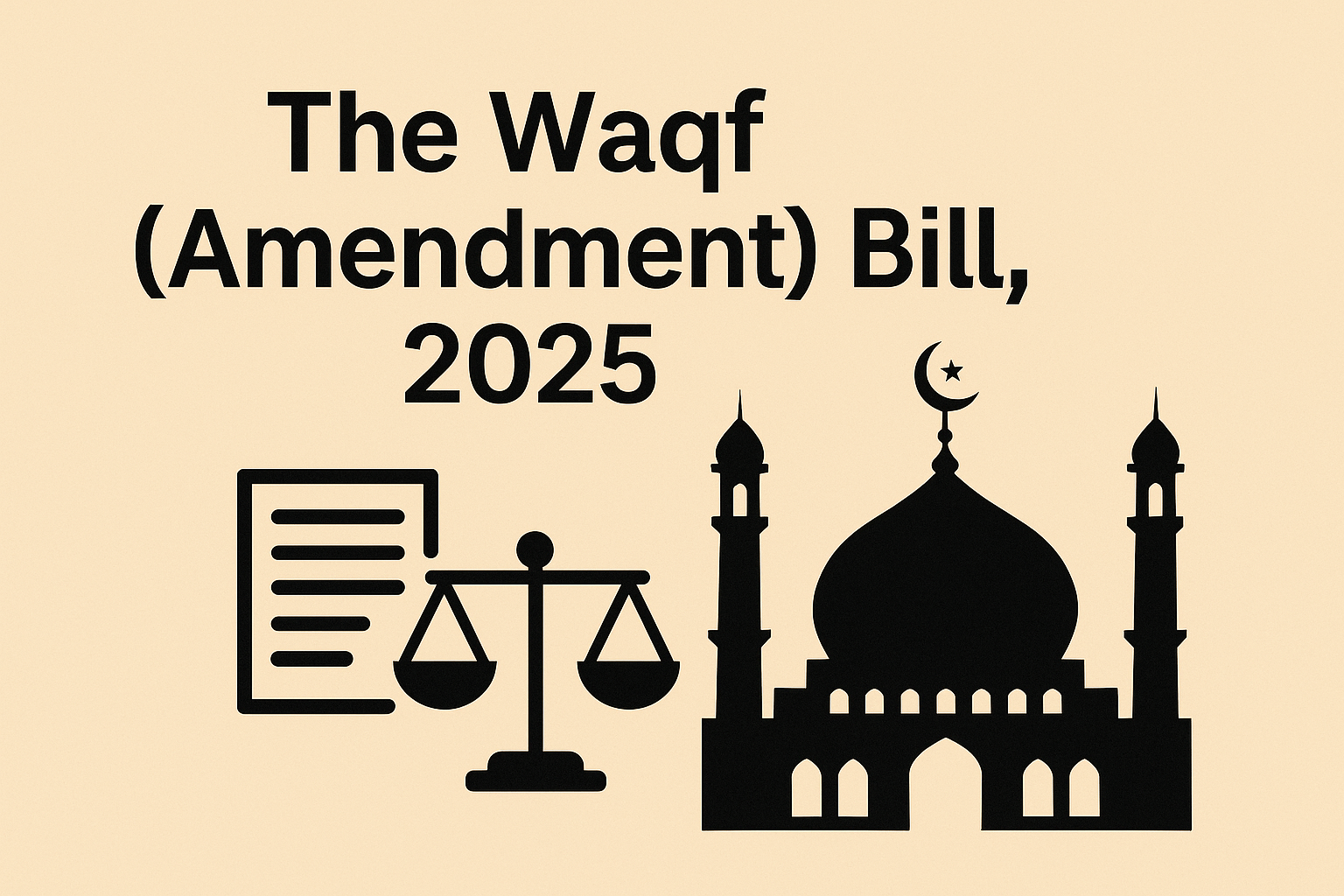India’s legal and social framework has continuously evolved to meet the demands of justice, secularism, and minority rights. In this context, the Waqf (Amendment) Bill, 2025, introduced in Parliament, has stirred considerable discussion. While some hail it as a landmark step toward modernization and transparency, others see it as a move that could centralize control and potentially marginalize stakeholders.
This guest post explores the background, key provisions, objectives, criticisms, and potential implications of the Waqf (Amendment) Bill, 2025.
🔍What is Waqf?
Waqf is an Islamic endowment of property—movable or immovable—dedicated for religious or charitable purposes. These may include mosques, dargahs, graveyards, schools, hospitals, or other community welfare facilities.
In India, waqf properties are governed under the Waqf Act, 1995, and administered by State Waqf Boards, which operate under the supervision of the Central Waqf Council.
📜 Background of the Amendment
The Waqf system in India manages assets worth thousands of crores, making it one of the largest endowment systems in the world. Despite this, it has long been plagued by issues such as
-
Mismanagement and corruption
-
Encroachments and illegal transfers
-
Lack of digitization
-
Limited community involvement
The Waqf (Amendment) Bill, 2025, was introduced to address these long-standing concerns. It seeks to modernize the administration and governance of waqf properties through transparency, efficiency, and legal safeguards.
Waqf (Amendment) Bill, 2025 introduced in Parliament
🏛️ Key Highlights of the Waqf (Amendment) Bill, 2025
1. Mandatory Digitization
-
All waqf properties must be digitized within 12 months of the bill becoming law.
-
GIS mapping and tagging will become compulsory for all waqf lands.
-
A national waqf digital portal will be established for public access to waqf data.
2. Time-Bound Dispute Redressal
-
Establishment of Waqf Tribunals in each state.
-
All property-related disputes must be resolved within 6 months.
3. Audit and Accountability
-
Annual auditing of waqf boards by CAG (Comptroller and Auditor General) or certified chartered accountants.
-
Audit reports must be made public within 90 days.
4. Encroachment Removal
-
Strict penalties for illegal possession or construction on waqf land.
-
Provision for summary eviction by District Magistrate after the board’s notice.
5. Community Representation
-
At least one-third of board members must be from the local Muslim community.
-
Women’s representation made mandatory in waqf boards.
6. Ban on Sale of Waqf Properties
-
Sale or permanent transfer of waqf land is prohibited under any circumstance.
-
Leasing is permitted only under strict rules with transparent tendering.
7. Judicial Review Limitations
-
Jurisdiction of civil courts is barred in matters where waqf tribunal decisions exist.
-
Appeals lie only in High Court under Article 226/227.
🎯 Objectives of the Bill
-
Ensure better utilization of waqf assets for community welfare
-
Bring transparency in governance
-
Prevent misuse and unauthorized transfers of land
-
Boost accountability and streamline dispute resolution
-
Empower minority voices in board decisions
🧭 The Rationale Behind the Bill
India has nearly 6 lakh registered waqf properties, with many more unregistered. In the past, media and investigative reports have revealed that large swaths of waqf land are either under encroachment, poorly managed, or commercialized illegally.
The government claims that the Waqf (Amendment) Bill, 2025, is a non-political, welfare-centric initiative aimed at using these properties for education, healthcare, and skill development within the Muslim community.
💬 Mixed Reactions from Stakeholders
👍Supporters Say:
-
Digitization and auditing will curb corruption.
-
Community participation will increase trust and inclusivity.
-
Quicker resolution of disputes will save time and legal costs.
👎Critics Argue:
-
The bill gives too much power to executive authorities, especially DMs.
-
Blocking civil court jurisdiction may violate natural justice.
-
Fear that waqf properties may be indirectly controlled by state machinery.
-
Women’s reservation is welcomed but needs clarity in implementation.
🧑⚖️ Legal and Constitutional Perspectives
The bill is being examined under the lens of Article 26 (Freedom to manage religious affairs) and Article 30 (Rights of minorities to manage their institutions).
Some experts argue that state interference in waqf matters must be balanced against the right of the community to self-manage its religious endowments.
A few petitions are also expected to be filed in high courts or the Supreme Court challenging the limitations on civil court access.
📊 Comparison with Previous Acts
| Feature | Waqf Act, 1995 | Waqf (Amendment) Bill, 2025 |
|---|---|---|
| Digitization | Optional | Mandatory with mapping |
| Dispute Mechanism | Delayed, Overburdened | Fast-track tribunals |
| Sale of Waqf Land | Possible (with permission) | Completely Prohibited |
| Public Access to Records | Limited | Full online access |
| Audit Responsibility | Internal | CAG or independent auditors |
| Community Representation | Not defined | One-third and women included |
📌 Case Study Example
In Hyderabad, a 200-acre waqf land valued at ₹2,000 crore had been under illegal occupation by builders. Local activists welcomed the new bill, hoping for quicker action and reclamation.
Similarly, in Bhopal, locals launched a portal listing neglected waqf lands in the area. They see digitization as a game changer in protecting religious assets.
🌍 International Comparison
Waqf management in countries like Turkey, Malaysia, and the UAE is highly digitized and professionally managed through dedicated Islamic endowment bodies. India’s new bill seeks to bring its waqf system closer to these global best practices.
📢 Public Involvement and Awareness
The government has launched awareness campaigns and is encouraging community participation through:
-
Local board elections
-
Suggestion boxes and online complaints
-
Waqf literacy programs in madrasas and universities
🔮 Way Forward
For the Waqf (Amendment) Bill, 2025 to succeed, the following steps are essential:
-
Clear rules for implementation
-
Strong monitoring at local levels
-
Regular audits and community feedback
-
Training of Waqf Board officials
-
Avoiding political misuse of waqf assets








